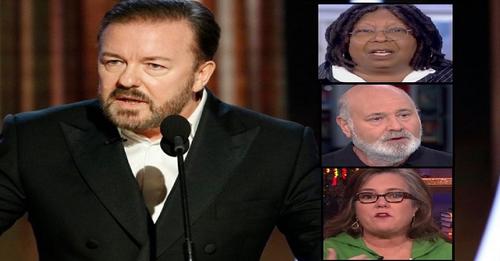Comedian Ricky Gervais slammed celebrities who constantly misuse their influence, asserting that people are getting sick of it. Was he right? You decide
Ricky Gervais is a comedian who’s not afraid to turn the spotlight on celebrities. The British comedian ruffled feathers several times while hosting awards ceremonies. However, his participation at the Golden Globes in 2020 managed to garner the most attention when the comedian unapologetically lambasted Hollywood celebrities and tech companies for using the event as a platform to make political statements.
Gervais, who revealed he would never host the Oscars because they would never allow him the freedom to do his brand of comedy, had some pointed comments on the celebrity award events while speaking with The Sun. “The first time I did it, ten years ago, everyone was like, ‘Ah, how can you talk to these wonderful multi-millionaires, how can you talk to these beautiful people, like that? We love celebrities,’” Gervais pointed out, adding, “By the last one it was like, ‘God, give it to them, we hate celebrities!’”

The comedian then proceeded to explain why he believes people have turned on celebrities in recent years, suggesting that it all comes down to their hypocritical, incessant virtue signaling. “I know what it is,” Gervais declared. “With all of the austerity and people struggling, they think, ‘Why are these people lecturing me? They’re going to an awards ceremony in a limo and are telling me to recycle?’”
Gervais further expanded on his theory. “People just got sick of it, just got sick of virtue signaling. And they were like a beacon to aim their wrath at. The people with nothing became tired of being lectured by people who had everything. You have to make a decision as a comedian,” Gervais asserted, adding, “Do you pander to the 200 most privileged people in the world in the room or the 200 million watching at home?”
“In comedy, traditionally, we are jesters. We have low status. So I’m down in the mud with the other peasants, having a go. I’ve got to be on their side. That’s why I go out there with a beer and look like a slob because I’ve got to show people that I’m on their side,” Gervais elaborated.
“And that’s what is hard nowadays, to be a stand-up comedian and keep your lower status, because everyone knows how much you’ve earned,” Gervais stated, going on to explain how he cleverly caters to the audience in a manner that is relatable. “So I do it in two ways. I act like a slob. I go out in bad jeans and a bad T-shirt and drink beer out of a can. I remind them I’m one of them, I shouldn’t be here, I’m lucky.”

The British funnyman also explained that offending people doesn’t mean you’re wrong. “I always say, ‘Just because you’re offended doesn’t mean you’re right,’” he said. “Some people are offended by a quality. So I’m never trying to offend, but in this new tour [Ricky Gervais: Humanity] it is about freedom of speech and offense culture.”
Gervais also lamented how the 2020 Golden Globe appearance affected his career. “I’ve never considered myself…I don’t know, I think I got that reputation from the Golden Globes, maybe, where I gently ripped some of the richest, most privileged, beautiful people in the world,” he said. “I can justify every joke. And I think some people get offended when they mistake the subject of the joke with the actual target; particularly when you’re dealing with taboo subjects.”

Gervais came under attack by GLAAD, which says they are an American non-governmental media monitoring organization, founded as a protest against defamatory coverage of gay and lesbian people. “We watched the Ricky Gervais ‘comedy’ special on Netflix so you don’t have to,” GLAAD said. “It’s full of graphic, dangerous, anti-trans rants masquerading as jokes.”
The controversial comedian fired back. “My target wasn’t trans folk, but trans activist ideology,” he told The Spectator in an interview. “I’ve always confronted dogma that oppresses people and limits freedom of expression,” he said. “It was probably the most current, most talked about, taboo subject of the last couple of years. I deal in taboo subjects and have to confront the elephant in the room.”





